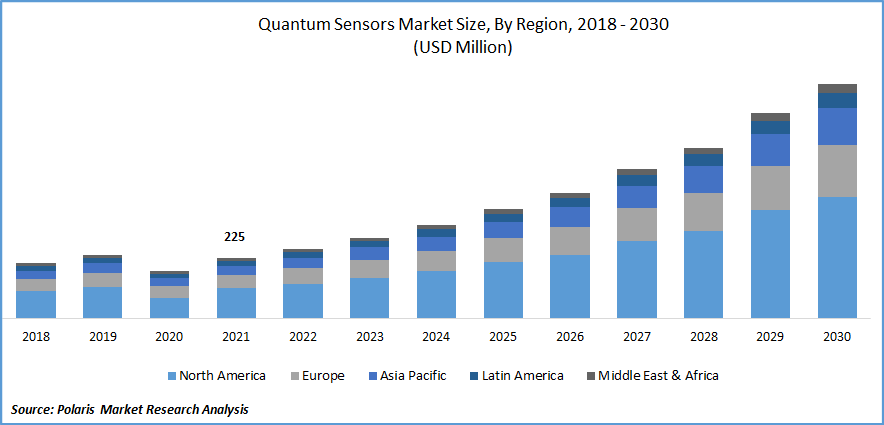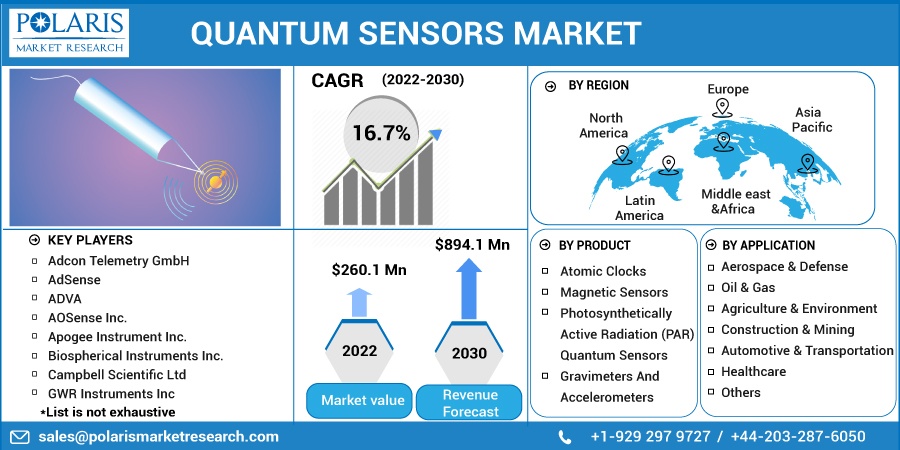
Quantum Sensors Market Share, Size, Trends, Industry Analysis Report
By Product (Atomic Clocks, Magnetic Sensors, PAR Quantum Sensors, Gravimeters & Accelerometers); By Application; By Region; Segment Forecast, 2022 - 2030
- Published Date:Nov-2022
- Pages: 114
- Format: PDF
- Report ID: PM2825
- Base Year: 2021
- Historical Data: 2018-2020
Report Outlook
The global quantum sensors market was valued at USD 225 million in 2021 and is expected to grow at a CAGR of 16.7% during the forecast period. The growing demand for quantum sensors is expected to be driven by the increasing demand across automotive, medical, and defense sectors and to measure and monitor the behavior of quantum environments across diverse states.

Know more about this report: Request for sample pages
Quantum sensors (QS) are advanced technology that improves the accuracy of navigation, measurement, and interaction of changing motion and electric and magnetic fields across various verticals. Additionally, these sensors are highly sensitive and used in multiple applications of renewable energy, nuclear energy, and geothermal energy. Furthermore, these sensors are incorporated with various power plants to derive energy output which is expected to drive market growth.
The COVID-19 pandemic had a negative impact on the growth of the market. Negligible operations in various end-use industries requiring sensors to improve the overall product performance, such as automotive, military, and defense, were temporarily shut down owing to the government's stringent rule. Furthermore, the lack of raw materials, skilled labor, and resources shortage led to supply chain disruption hampering the market growth.
However, researchers have developed a tool based on nitrogen-vacancy centers in nanodiamonds incorporated with quantum sensors to translate the presence of SARS-CoV-2, which improved the diagnostic methods during the pandemic years. Due to their superior sensitivity, Quantum sensors have enhanced detection methods, which influenced the market growth.
Though the demand for quantum sensors for complex applications is rising, the higher installation cost hampers the market growth, which results in a consumer shift towards low-cost alternatives. In addition, there is a lack of awareness among individuals about the uses and benefits of QS, which is likely to restrain market growth.
 Know more about this report: Request for sample pages
Know more about this report: Request for sample pages
Industry Dynamics
Growth Drivers
The rising need for high-precision measurements in crucial applications raised the demand for quantum sensors. Also, high sensitivity and frequency increase their demand across automotive and healthcare and are adopted by various communication technologies. Additionally, the rising demand for IoT devices and emerging trends of smart automation are also increasing the need for quantum sensors. Furthermore, scientists are also focusing on developing innovative sensors to provide faster and more accurate results, which help to push forward the industrial 4.0 revolution, which is projected to fuel the market.
In addition, quantum sensors also have a huge application across the healthcare sector for measuring blood flow, metal implants, and analyzing medical images. Furthermore, the rising penetration of quantum technologies in MRI, MMG, and analysis of medical sensitivity at the cellular level are also uplifting market growth. Moreover, the growing demand for biomedical applications to diagnose neurological and various critical conditions is also boosting market growth.
For instance, Bosch partnered with IBM and launched quantum sensors for a variety of applications in the biomedical industry to diagnose nerve impulses and stimulate prosthetics movement and also help to diagnose neurological conditions such as Alzheimer such factors are responsible for propelling the market growth.
Report Segmentation
The market is primarily segmented based on product, application, and region.
|
By Product |
By Application |
By Region |
|
|
|
Know more about this report: Request for sample pages
Atomic Clocks Accounted for the Largest Share in 2021
The atomic clocks segment accounted for the highest revenue share in 2021 owing to their accuracy and source of oscillation which is atoms characteristics. Additionally, the rapid utilization of atomic clocks in scientific areas such as long baseline interferometry in radioastronomy is expected to drive segment growth over the forecast period.
Furthermore, the growing deployment at sites of time signal radio transmitters to deliver precise frequency is also complementing the market growth. Moreover, atomic clocks are also used in space navigation and act as GPS satellites. The quartz oscillator gives accurate measurement and allows autonomous navigation with minimum communication to and from the earth during distant locations missions which is also considered an important factor to fuel the segment growth further.
Aerospace and Defense are Expected to Witness Faster Growth
The demand for QS in aerospace and defense is expected to surge significantly over the forecast period owing to the rising geopolitical tension across various countries, which led to the development of non-GPS-based technologies. In addition, quantum technologies have broad applications, from surveillance to 3D imaging, which are projected to boost market growth.
Furthermore, quantum sensors are used in many critical conditions during combat, such as detecting the low concentration of target gas and navigating and communicating underwater and in the air. For instance, U.S. Navy researchers chose DCS corporation to develop and understand device engineering and advanced operational techniques to resolve military problems and also used for reconnaissance. This system will involve quantum optics, laser physics, and fiber-optic sensors; such factors will likely complement the market growth.
North America Dominated the Market and is Expected to Witness Fastest Growth over the Forecast Period
North America is the largest region for quantum sensors. It is expected to witness faster growth over the forecast period owing to the rising commercialization of quantum-based technologies in defense and military applications. Increasing government funding to develop surveillance and navigation applications is expected to drive market growth. Moreover, the growing automotive and healthcare infrastructure is also propelling market growth.
Asia Pacific is also expected to grow over the forecast period owing to the increasing consumer shift to IoT devices and smart devices, and the growing demand for autonomous vehicles across China, Japan, and South Korea is expected to propel the market growth. Moreover, the rising R&D investment by many players to deliver accurate location and measurement. For instance, the Sumitomo corporation is expected to bring quantum sensors that measure up to 1,000 times compared to conventional sensors. This technology provides position information in an autonomous vehicle where GPS signals are unavailable, which is expected to boost the market.
Competitive Insight
Some of the major players operating in the global market include Adcon Telemetry GmbH, AdSense, ADVA, AOSense Inc., Apogee Instrument Inc., Biospherical Instruments Inc., Campbell Scientific Ltd, GWR Instruments Inc, Impedance Ltd, LI-COR Inc, M Squared Laser Ltd, METER GROUP, Microchip, Microsemi Corp., Muquans SAS, Radix, Robert Bosch GmbH, Sea-Bird Scientific, Skye Instruments Ltd, Spectrum Technologies Inc., Thomas Industrial Network Inc., and Qnami.
Recent Developments
- In September 2022, The Massachusetts secretary of housing and economic development partnered with the northeastern university, Massachusetts technology collaborative, and Experiential Quantum Advancement Laboratories to develop and accelerate next-generation quantum technologies. Moreover, Qnami also announced to delivery of the first commercial scanning NV microscope.
- In September 2022, Tokyo tech and Yazaki corporation partnered and developed MEXT Q-LEAP to resolve the issue of battery inefficiency in electric vehicles with the help of a diamond quantum sensor prototype.
Quantum Sensors Market Report Scope
|
Report Attributes |
Details |
|
Market size value in 2022 |
USD 260.1 million |
|
Revenue forecast in 2030 |
USD 894.1 million |
|
CAGR |
16.7 % from 2022 - 2030 |
|
Base year |
2021 |
|
Historical data |
2018 - 2020 |
|
Forecast period |
2022 - 2030 |
|
Quantitative units |
Revenue in USD million and CAGR from 2022 to 2030 |
|
Segments Covered |
By Product, By Application, By Region |
|
Regional scope |
North America, Europe, Asia Pacific, Latin America, Middle East & Africa |
|
Key Companies |
Adcon Telemetry GmbH, AdSense, ADVA, AOSense Inc., Apogee Instrument Inc., Biospherical Instruments Inc., Campbell Scientific Ltd, GWR Instruments Inc, Impedance Ltd, LI-COR Inc, M Squared Laser Ltd, METER GROUP, Microchip, Microsemi Corp., Muquans SAS, Radix, Robert Bosch GmbH, Sea-Bird Scientific, Skye Instruments Ltd, Spectrum Technologies Inc., and Thomas Industrial Network Inc. |
